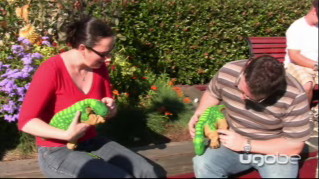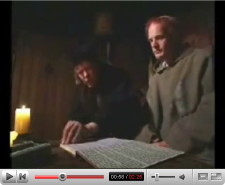Last Tuesday morning I had the pleasure of entertaining a group of attendees to the Matterealities workshop @ lancaster. Hans and I had organised a series of demos in the dept. during the morning (physiological gaming, Firefly (intelligent fairylights), VoodooIO, something to do with keyboards) … but as computer scientists are nocturnal the demos did not start until 10am, and so I got to talk with them for around an hour beforehand :-/
The people there included someone who studied people coding about DNA, someone interested in text, anthropologosts, artists and an ex-AI man. We talked about embodied computation, the human body as part of computation, the physical nature of code, the role of the social and physical environment in computation … and briefly over lunch I even strayed onto the modeling of regret … but actually a little off topic.

physicality – Played a little with sticks and stones while talking about properties of physical objects: locality of effect, simplicity of state, proportionality and continuity of effect.
physical interaction – Also talked about the DEPtH project and previous work with Masitah on natural interaction. Based on the piccie I may have acted out driving when talking about natural inverse actions
ubiquity of computation – I asked the question I often do “How many computers do you have in your house” … one person admitted to over 10 … and she meant real computers. However, as soon as you count the computer in the TV and HiFi, the washing machine and microwave, central heating and sewing machine the count gets bigger and bigger. Then there is the number you carry with you: mobile phone, camera, USB memory stick, car keys (security codes), chips on credit cards.
 However at the Firefly demo later in the morning they got to see what may be the greatest concentration of computers in the UK … and all on a Christmas Tree. Behind each tiny light (over 1000 of them) is a tiny computer, each as powerful as the first PC I owned allowing them to act together as a single three dimensional display.
However at the Firefly demo later in the morning they got to see what may be the greatest concentration of computers in the UK … and all on a Christmas Tree. Behind each tiny light (over 1000 of them) is a tiny computer, each as powerful as the first PC I owned allowing them to act together as a single three dimensional display.
embodiment of computation – Real computation always happens in the physical world: electrons zipping across circuit boards and transistors routing signals in silicon. For computation to happen the code (the instruction of what needs to happen) and the data (what it needs to happen with and to) need to be physically together.
The Turing Machine, Alan Turing’s thought experiment, is a lovely example of this. Traditionally the tape in the Turing machine is thought of as being dragged across a read-write head on the little machine itself.
However … if you were really to build one … the tape would get harder and harder to move as you used longer and longer tapes. In fact it makes much more sense to think of the little machine as moving over the tape … the Turing machine is really a touring machine (ouch!). Whichever way it goes, the machine that knows what to do and the tape that it must do it to are brought physically together.
This is also of crucial importance in real computers and one of the major limits on fast computers is the length of the copper tracks on circuit boards – the data must come to the processor, and the longer the track the longer it takes … 10 cm of PCB is a long distance for an electron in a hurry.
 brain as a computer – We talked about the way each age reinvents humanity in terms of its own technology: Pygmalion in stone, clockwork figures, pneumatic theories of the nervous system, steam robots, electricity in Shelley’s Frankenstein and now seeing all life through the lens of computation.
brain as a computer – We talked about the way each age reinvents humanity in terms of its own technology: Pygmalion in stone, clockwork figures, pneumatic theories of the nervous system, steam robots, electricity in Shelley’s Frankenstein and now seeing all life through the lens of computation.
This withstanding … I did sort of mention the weird fact (or is it a factoid) that the human brain has similar memory capacity to the web … this is always a good point to start discussion 😉
While on the topic I did just sort of mention the socio-organisational Church-Turing hyphothesis … but that is another story
more … I recall counting the number of pairs of people and the number of seat orderings to see quadratic (n squared) and exponential effects, the importance of interpretation, why computers are more than and less than numbers, the Java Virtual Machine, and more, more, more, … it was very full hour



 Sony have robot dogs, Phillips robot cats (albeit stuck sitting in one place) but Ugobe have little robot dinosaurs called Pleo. In the videos they do move like little baby creatures and the lady in the shopping mall coos over one as she strokes it.
Sony have robot dogs, Phillips robot cats (albeit stuck sitting in one place) but Ugobe have little robot dinosaurs called Pleo. In the videos they do move like little baby creatures and the lady in the shopping mall coos over one as she strokes it. embodiment – they feel through 40 sensors and move in their environment
embodiment – they feel through 40 sensors and move in their environment


 that you see in trees outside hotels and in city centres throughout the year; what if you could turn those into a display?
that you see in trees outside hotels and in city centres throughout the year; what if you could turn those into a display?


 However at the
However at the 


